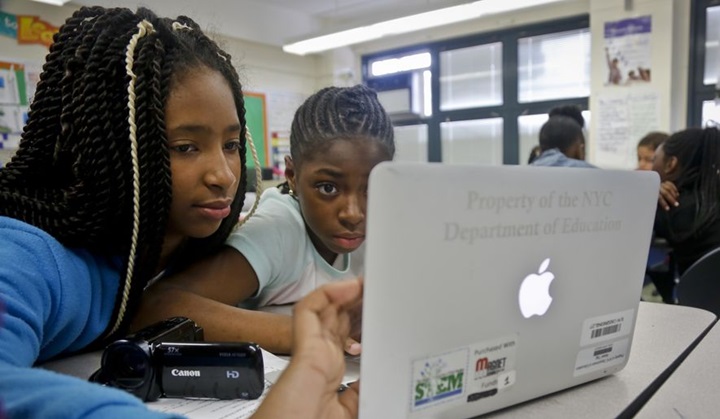Have you ever wished to have a person whom you can really trust? Someone who you can express all your concerns to and get guidance from?
A mentor is someone who is wise and plays the role of both a trusted teacher and friend. The act of mentoring consists of a series of small successes, which gradually develop to create a major impact. It helps in advancing healthier youth development.
Organizations whose missions focus on healthy youth development, value the importance of mentoring. Mentoring comprises of several components from tutoring, to counseling, to being a life skills coach. Mentors can even take the role of a temporary guardian or therapist. Successful relationship results arise after being consistent with contacting for more than three months, have a strong connection between personalities, interests, and expectations of the mentors and mentees.

[Source: Associated Press, File]
At the end of the Mentor Match celebratory event, a mentor, Reshma Gajjar explains her reason for becoming a role model for other students.
“When I was growing up, I didn’t have a mentor, and I felt very alone on my path. I know how important having a mentor is in…one, not feeling alone…and two, just getting any kind of guidance and wisdom from somebody who has either been through it or somebody who is a little bit older and wiser and maybe has a different perspective on life.” Reshma continues, “When I found out about this mentor match program, I’m always excited…this is my way of maybe giving back to the community because I didn’t have one, and I know how nice it would’ve been for me if I had one. Therefore, I’m go[ing to] be one…that was kind of what inspired [me] to do mentor match.”
Mentoring benefits both the mentor and mentee in numerous ways. The opportunity to act as a role model for a child enhances the mentor’s personal and professional knowledge, and leadership skills. On top of that, the mentor might also learn something new from the mentee.

[Source: Lucy Schaly/Beaver County Times via Associated Press]
By providing emotional support, motivation, advice, and strategic feedback, they become an important resource for success.
According to a recent report by The National Mentoring Partnership, children who had supportive mentors that were both well-prepared and had the ability to relate to the youth were, “55% more likely to enroll in college, 78% more likely to volunteer regularly, 130% more likely to hold leadership positions.” The findings in that report also showed that students are, “46% less likely to use drugs and 81% more likely to participate in extracurricular activities.”
Whether it may be a regular meeting between the mentor and student once a week, or once a month, each meeting has a significant impact on the lives of mentees. The meetings between mentors and mentees help model positive, safe, and effective environments for students.
Additionally, human nature values emotions and it is important to understand that everyone endures real-life experiences. It is critical to respect one another’s individuality, to listen, and to learn from each other’s stories because it might prove to be very useful in the future.
Even if the role of a mentor is a heavy responsibility, encouraging the young, and sharing valuable knowledge, can lead to an increase in self-esteem, self-awareness, and a positive-mindset towards school. It can also decrease the key symptoms that lead to depression and illicit behavior.
A study by the Big Brothers Big Sisters (BBBS) Program shows that students, “…earned higher grades…youth in school-based mentoring programs turned in higher quality class work, did better academically…completed more of their assignments…Better school attendance. Youth with mentors had fewer unexcused absences from class than students without mentors… Teachers of students in the BELONG mentoring program reported that students participating in mentoring were more engaged in the classroom and also seemed to place a higher value on school than students who did not have mentors.”
The younger generations look up to mentors and put a lot of faith and trust in their ability to lead by example and point them in the right direction. Being around an individual who always acknowledges other’s thoughts, opinions, and concerns will become a learning experience for teens to grow intellectually, socially, and emotionally. It teaches the students independence by building confidence within themselves.
Being provided a mentor should not be a privilege, but a necessity. In life, there will be many times that each of us will feel lost or hopeless, and that’s why everyone needs a person who is there for them – through thick and thin – and can show them the light at the end of the tunnel.
Joanne Chae, Grade 9
TREE Academy

